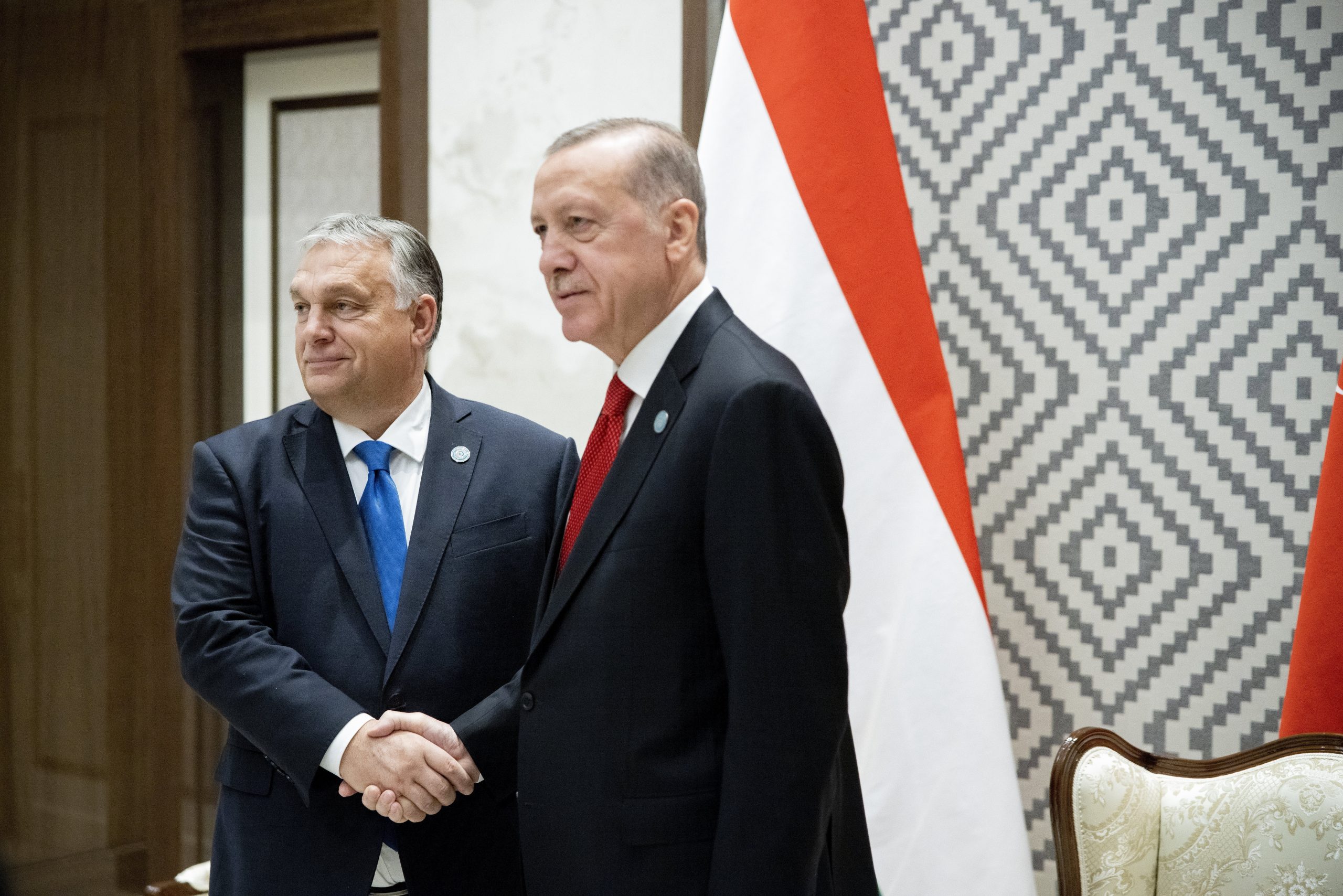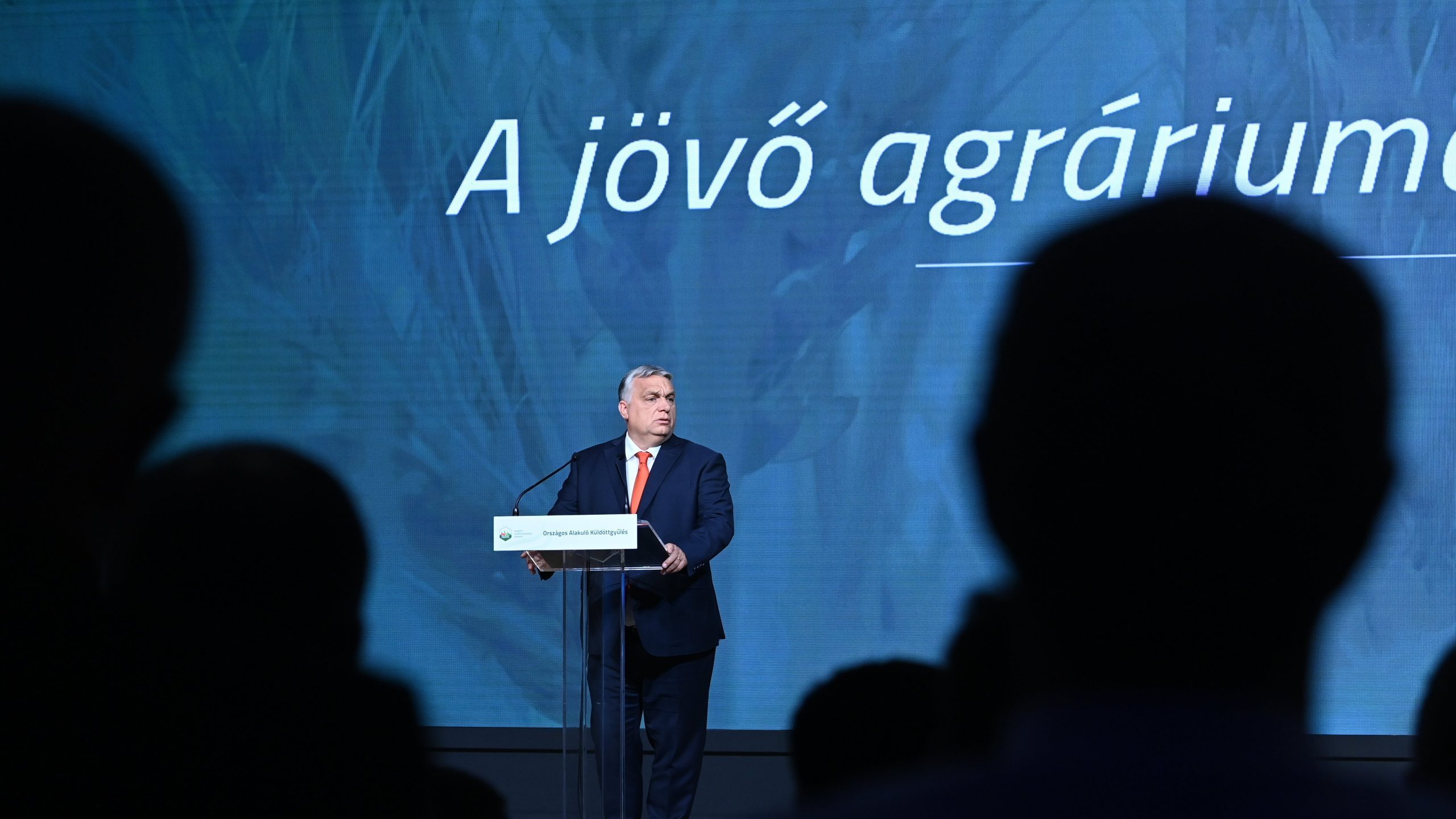
Good morning, Ladies and Gentlemen, Your Excellency Mr. President,
Allow me to welcome you all. I especially welcome Adnan Polat, Chairman of the Turkey-Hungary Business Council. Our talks were extremely stimulating. My respect and thanks are due to President Erdoğan for the openness and friendship which he showed us at these talks. I will refer back to his visit in 2013, when he identified some long-term goals for Turkish-Hungarian economic cooperation, asking for a significant increase in the volume of Turkish-Hungarian trade. At that time we agreed on the figure of five billion dollars, while yesterday we concluded that a target of six billion was achievable. My address is an introduction to President Erdoğan’s speech, so I would like to say a few words about the western half of Europe.
Honourable Turkish Friends,
Everyone in the Western world feels that there is something in the air. In the Western world the language of politics, and political conflict itself, have become harsher – and are at times outright brutal. New technologies have emerged in the contest for power: the phenomenon of social media and the world of fake news, which now also affects governments. Over the past twenty years a sizeable section of the European middle classes have been unable to make progress. In addition, large masses of people not subject to any form of screening are moving towards the Europe’s borders. And after earlier prevailing ideals and the era of global governance, one can also see attempts being made to return to governance within national boundaries. In the Western world proof of this can be seen in Brexit and the election of US president Donald Trump. And so over here we sense that changes on an enormous scale are taking place in the world, and the prevailing feeling in the world in which we live – which we call the Western world – is uncertainty. This also sets the atmosphere in business and in political life. This presents players in European political and economic life with a challenge: everyone in Europe wants security and predictability, and every leader is seeking ways in which to provide security and predictable futures for their own people.
When you look at Hungary, Dear Turkish Friends, you see a country which is also seeking its own path. We returned to power in 2010, after the election that year, and then we made the decision to create security and predictability for the Hungarian people by building a specifically Hungarian model. This Hungarian model is based on job creation, tax reductions and pay rises. Last year the Hungarian economy grew by more than 4 per cent, its growth appears to be stable and sustainable, and its foundations are broad. Unemployment, which in 2010 was over 11 per cent, is now down to around 3.5 per cent. I hereby inform President Erdoğan that in Hungary the declared goal is to reach full employment, and this is now well within reach. When you look at Hungary, you perhaps know that we have practically no natural resources: we have no industrial raw materials, we have no gas, we have no oil, and we have no sources of energy. Everything that you see here in Hungary and in the fantastic city of Budapest, has been built with our own knowledge and hard work. What you see in Hungary is a tribute to hard work and the capacity of the human brain. Therefore it is crucial for Hungary to be competitive: to be open and competitive in our economy. You have heard the figures from the Minister: Hungary can now be regarded as a competitive country, but I hereby assure President Erdoğan that we are not at satisfied with the current state of affairs. The competitiveness of the Hungarian economy must be radically improved. We shall take further important steps, and the Hungarian government will soon – perhaps this week – adopt a major action plan designed to boost competitiveness.
Ladies and Gentlemen,
Hungary already has its budget for 2019, which also seeks to support predictability: business actors can familiarise themselves with the state’s economic figures for next year well before the end of this year. Therefore you may be aware that tax reductions will continue next year, and we are expecting significant economic growth.
Your Excellency Mr. President,
You have no doubt noticed that after 2010 the present government was given very strong parliamentary mandates in the following two elections; and therefore we are able to say that Hungary has the most stable government in Europe – or, to be modest, one of the most stable governments. We see it is as fortunate that Turkey also has a stable governmental system, and a leader with a strong mandate. We trust that economic cooperation between two stable governments will lead to great success. With regard to Turkey, I must point out that as a matter of course we are allies, as both countries are members of NATO: the closest military alliance in the world today.
As regards economic cooperation, I would also like to congratulate Turkish investors, who have come to Hungary and have created hundreds of jobs here. In Hungary Turkish businesses employ more than one thousand people. According to our investment agency, negotiations are under way on eight important Turkish projects, and we have high hopes that as a result there will be investments worth half a billion dollars. Our trade potential is extraordinary. We are talking about a country of ten million people, but last year the value of our exports exceeded 100 billion euros: as a country of ten million we’re generating exports of 100 billion euros! I would like to draw the attention of companies in attendance to Eximbank’s “country limit”: we seek to provide preferential loans to Turkish-Hungarian companies engaged in business activities. I would also like to draw the attention of everyone here to the fact that we operate five external market offices in Turkey. I encourage you to contact these offices.
Your Excellency Mr. President,
Here I should mention that we are also a member of a market of 500 million, the European Union; and within this we belong to a special alliance called the V4. This is a Central European alliance, comprising Poland, the Czech Republic, Slovakia and Hungary. If these four countries were not members of the European Union, there would be no economic growth in the European Union today. This in turn means that the European economy’s growth engine is here in Central Europe. People here in Central Europe are at the very heart of European economic growth. Therefore I am not only drawing your attention to Hungary, but to the entire Central European region: a region of 64 million people. You number more than 80 million. Cooperation between the two regions could represent major economic potential. The question is how we can organise our cooperation.
And finally, Your Excellency Mr. President, we must also think of the future. While one may like to believe that one can continue managing one’s affairs until the end of the world, we all know that the prospects for that are rather limited. Therefore we must also think of the future; and the future means young people. Therefore I’m glad that President Erdoğan and I always agree that friendship and cooperation between the two nations must also be built at the level of young people. Hungary has a scholarship programme. We have offered Turkey 150 state-funded scholarships, so that every year 150 young Turkish people can come to Hungary to study here, to get to know us, to develop relationships, and later to become ambassadors of Turkish-Hungarian economic and political cooperation. I am pleased to see that the offer of 150 scholarships is oversubscribed by a factor of two and a half. This means that this programme has a future, and so we shall repeat it every year. And, finally, we also thank President Erdoğan for Hungary having been given observer status in the International Turkic Academy, and that from now on Hungarian researchers will also be able to take part in the work of this international institution.
Honourable Ladies and Gentlemen, Dear Turkish Guests,
I sincerely hope that your interest in Hungary has been aroused not only by our words, but also by your personal experiences. I ask the Turkish businesspeople here to spread word of Hungary in a positive light. Tell everyone in Turkey that you are welcome here. Encourage Turkish business actors to come to Central Europe and try their luck here, because here they can set up business with good economic prospects. And, finally, I wish to express my respect and thanks to President Erdoğan for having supported the activities of Turkish businesspeople in Hungary for many years, and for the decisions of his government which create opportunities for Hungarian business actors to invest and trade in Turkey.
Thank you for your attention.

